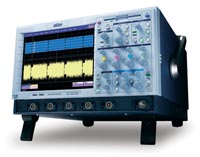
Request Information
Refurbished
Leading Features
Maximum Performance Since their inception, Disk Drive Analysis (DDA) Series oscilloscopes have helped data storage design engineers improve the time to market of new products and accelerated understanding and failure analysis on existing drives. LeCroy continues that tradition with its powerful Disk Drive Analysis toolset, enabling you to capture, view, and analyze the waveshape of high-speed, complex drive signals with speed and integrity. LeCroy's X-Stream architecture integrates SiGe "digitizer on a chip" technology and a specialized high-speed streaming bus design to transfer data from the ADC to a proprietary acquisition memory. The X-Stream architecture enables disk drive engineers to quickly, easily, and accurately measure and analyze disk drive signals. The DDA 5005A is designed for signal fidelity, whole track acquisition and analysis for read channel, media noise analysis, and head parametrics with the longest acquisition memory standard. The DDA 3000 provides the same measurement capability at a lower bandwidth. This unique product has the convenience of selectable 50 Ω or 1 MΩ inputs. Excellence in Head, Disk,Track, and Noise Analysis The DDA Series analyzers incorporate the tools to make you the most efficient. The standard 100 Mpts of capture memory in the DDA 3000 (2 channel mode) and DDA 5005A XXL provides 5 milliseconds of single-shot 20 GS/s capture on two channels, allowing multiple drive sectors to be acquired at once. Long Memory and Flexibility in Finding Problems Acquire a head signal up to 5 GHz, and then QuickZoom it from the front panel. The DDA copies and expands the drive signal automatically. Simply scroll horizontally and vertically to examine any sector. Multiple zooms let you view up to eight separate areas of the head signal; each zoom comes in a distinct color. You can measure the time between two events accurately with horizontal and vertical cursors. Disk drive parameters let you characterize the pulse width variation or signal–to–noise ratio across a selectable region. Failure Analysis engineers can store and recall golden waveforms and panel setups to compare problem drives with the known good drives. Analog–to–digital converters running at speeds up to 20 GS/s ensure the right sensitivity to measure today's high-speed read channels. In every DDA, you can run your customer-developed scripts to view the captured signal with the filters matched to your channel and media. Custom user scripts can be created in MATLAB, Mathcad, Visual Basic, or even Excel. Exceptional Trigger Performance Disk Triggers allow you to set up a series of events in the signal that then cause a trigger. For example, qualify the signal on the index signal and then capture all the sectors of information on the track. As memory is increased in the DDA, more sectors can be captured, with up to 50 picosecond/sample time resolution. Up to 25,000 sectors of data can be gathered with the DDA 3000 or DDA 5005A XXL. Natural Graphical Interface One press of the DDA button takes you directly to the Disk Drive Analyzer features. The familiar controls on the front panel, coupled with a natural, context-sensitive graphical user-interface, reacts quickly to your commands. Functionality is exactly where you expect it to be. If you have questions, context-sensitive on-line help gives immediate assistance. Cursors Cursors let you measure time and amplitude points on the disk waveforms. You can measure the time between gate and signal across two different channels. Different cursor modes are easily recalled and set. They are easily accessed from the front panel or the graphical user interface. Set up basic time or amplitude cursors on a single waveform, or choose to use independent cursors on different waveforms. Flexible Connectivity The DDA Series comes complete with a 100Base-T/10Base-T Ethernet connection and a built-in hard drive for waveform storage. At the press of a button, you can even e-mail the measurement result and waveform display to other engineers or to your notebook. Attach any USB device for extended connectivity for network printing, or for attaching additional storage or pointing devices. DMOD Option The DMOD math function adds seven new processing functions (Amplitude , Phase, Real, Imaginary, Complex, Frequency and Wideband AM). These demodulated waveforms are useful for many purposes:
Only two of the result types are rescalable, Frequency (FM) and Phase (PM), since the magnitudes of these projections cannot be known beforehand. All of the other results are scaled on the vertical scale of the original digitized carrier waveform. There are no parameters specific to the Demodulation math option. |
Teledyne LeCroy DDA-3000 Disk Drive Analyzer datasheet & specifications

